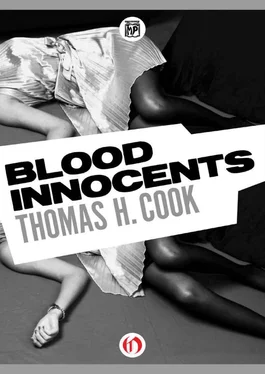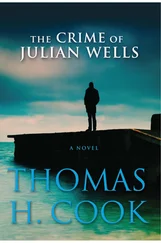Thomas Cook - Blood Innocents
Здесь есть возможность читать онлайн «Thomas Cook - Blood Innocents» весь текст электронной книги совершенно бесплатно (целиком полную версию без сокращений). В некоторых случаях можно слушать аудио, скачать через торрент в формате fb2 и присутствует краткое содержание. Жанр: Триллер, на английском языке. Описание произведения, (предисловие) а так же отзывы посетителей доступны на портале библиотеки ЛибКат.
- Название:Blood Innocents
- Автор:
- Жанр:
- Год:неизвестен
- ISBN:нет данных
- Рейтинг книги:5 / 5. Голосов: 1
-
Избранное:Добавить в избранное
- Отзывы:
-
Ваша оценка:
- 100
- 1
- 2
- 3
- 4
- 5
Blood Innocents: краткое содержание, описание и аннотация
Предлагаем к чтению аннотацию, описание, краткое содержание или предисловие (зависит от того, что написал сам автор книги «Blood Innocents»). Если вы не нашли необходимую информацию о книге — напишите в комментариях, мы постараемся отыскать её.
Blood Innocents — читать онлайн бесплатно полную книгу (весь текст) целиком
Ниже представлен текст книги, разбитый по страницам. Система сохранения места последней прочитанной страницы, позволяет с удобством читать онлайн бесплатно книгу «Blood Innocents», без необходимости каждый раз заново искать на чём Вы остановились. Поставьте закладку, и сможете в любой момент перейти на страницу, на которой закончили чтение.
Интервал:
Закладка:
Reardon stood up, astonished, and bolted across the center aisle to the subway window.
The man was shouting, but Reardon could not hear what he was saying. The man picked up a large vase and threw it across the room. The child darted behind the chair and squatted, and Reardon could see that he was covering his head with his tiny arms. Instantly the man wrenched the child from behind the chair and lifted him into the air above his head.
Reardon frantically tried to get the subway window open, but the latches were corroded shut.
The man threw the boy into the back of the chair, toppling it so that it spilled the child onto the floor.
Reardon began hitting the window with his fists again and again. “Stop it! Stop it!” he shouted. The other passengers in the train turned to look at him, and then at the scene in the apartment. But their attention returned to him, as if he were the greater threat.
The man picked the boy up again and slapped him across the room. Then he caught him by the collar and threw him across the legs of the toppled chair. The boy jumped to his feet and ran to a corner of the room, out of Reardon’s sight. The man began to walk slowly toward the corner.
Reardon’s knuckles were stiff and reddened; he stopped hitting the glass and stood trembling by the window.
The train jerked forward. Reardon’s eyes burned into the apartment window, but he could see nothing except the legs of the overturned chair, the jagged glass dotting the floor and the blank wall that stood behind it all, featureless and resolute, like a pitiless, refusing hand.
When the train reached 183rd Street, Reardon got off and called the local precinct to report what he had seen. He did not expect much action to be taken. He could not be that specific as to the location of the building, and he was unable to give a close, detailed description of either the man or the child.
“Thank you, Detective Reardon,” the desk sergeant at the precinct house said. “We’ll look into it.”
“I hope so,” Reardon replied, but he knew that the incident would not get a high priority. He had not even been asked to accompany a patrol car to find the building where he had seen the child beaten.
He took the same track back to Manhattan, but it passed the window so fast that he could not see anything in the room. The light was still on; that was all that he could tell.
He got off the train at 86th Street and walked to his apartment. The city was coming to life. Some people, Reardon knew, would not be around to see it. Some would be stuffed in car trunks. Others would be hanging in closets. Still others would be floating in bathtubs filled with blood and torn flesh. Mathesson had once referred to such a scene as “Manhattan clam chowder.”
Reardon wondered about the boy he had seen through the window. He thought of the tiny arms folded around the head. Perhaps, Reardon thought, that was the only appropriate posture for this world. In Catholicism, Reardon knew, there were two unforgivable sins: one of them was despair. Standing on the sidewalk amid the early-morning jostling of pedestrians, his shoulders hunched and combative, his face locked in an animal grimace, Reardon suspected that he might be edging toward the unforgivable.
19
When Reardon got to the precinct house later that morning, Mathesson met him at his desk. He stood hesitantly for a moment, as if waiting for the bustle of the precinct house to die down. Then he offered Reardon a slight smile.
“You’re back on the case,” he said.
“What?”
Mathesson’s eyes roamed over Reardon’s face and body. “Jesus, you look busted,” he said.
“What about the case?”
“You’re back on it.”
“Why?”
Mathesson stepped aside to allow Reardon to get to the chair behind his desk.
“Well, looks like Piccolini overstepped his authority a little, the prick. He got his ass chewed out. Downtown told that little dago they’d decide when you were off the case.” Mathesson smirked. “That little prick is just a paper pusher, and they know that downtown. He’s just a paper pusher; he don’t break cases. He don’t do anything.” Mathesson grinned. “Well, he got the shit kicked out of him this time.”
“What about Petrakis?” Reardon asked.
“What about him?”
“Where is he?”
“In the clink.”
“He was arrested?”
“Damn right,” Mathesson said. “I arrested him, myself, but it’s gonna go out as a real team effort.”
“Go out?”
“Haven’t you read the paper this morning?”
“No,” Reardon said.
Mathesson took a Daily News from under his arm and gave it to Reardon.
The whole story was there. The killing of the fallow deer, the investigation, and the arrest of the alleged perpetrator: Andros Petrakis. On the front page, directly under the headline, “Arrest in Deerslaying Case,” there were large full-scale photographs of Wallace, Melinda and Dwight Van Allen. On the inside there was a photo spread of the fallow deer cage, the entrance to the Children’s Zoo and the apartment building in which the Van Allens lived. There was also a picture of Reardon himself. In small type, under Reardon’s photograph, the copy read: “Detective John Reardon headed investigation which led to arrest.” There was a picture of the evening press conference at which the Police Commissioner had announced the breaking of the case. And in the right-hand corner there was a small photograph of Andros Petrakis.
“Did you meet the Van Allen kids?” Mathesson asked.
“One of them.”
“Twins,” Mathesson said.
“Yes, I know,” Reardon said indifferently. He stared at the pictures of the Van Allen family.
“That Melinda’s not a bad-looking girl,” Mathesson said.
Reardon remembered the rather tall, slightly overweight, generally unattractive young woman who had so annoyed and befuddled him a week before. “Not bad,” he said. He looked at Mathesson. “She has a kind face.”
Reardon’s first act after being reinstated on the case was to visit Petrakis at the Tombs, even though he dreaded seeing him there. If the precinct house had reduced Petrakis to a kind of gelatinous inactivity, he could only imagine what the grinding oppressiveness of the Tombs would do to him. It had been well named, Reardon thought, this prison of the City of New York; it was a place for the dead.
Petrakis was led out by a guard and seated at a table opposite Reardon. He had not changed much, Reardon saw instantly. The face retained its motionless, stony aspect, the eyes staring rigidly ahead but seeming to comprehend nothing beyond them – not movement or person or meaning.
“Have you contacted your family?” Reardon asked.
“No,” Petrakis said dully. He did not seem to see Reardon at all, but only to look through him, as if he were a ghost.
“Why not? Won’t they worry about you, about where you are?”
“I tell them I not come back,” Petrakis said in the same granite monotone of the precinct house.
“When?”
“Before I come to police.”
All around them there was sound and movement. Prisoners and their visitors were filing in and out amid a humming welter of hellos and good-byes, but Petrakis did not seem to be aware of any of it. It was as if he had closed himself up in a box of his own making and had sealed all its cracks from light and sound.
“Mr. Petrakis, did you kill those deer in the Children’s Zoo?”
“I will die for it,” Petrakis said.
“Killing animals is not a capital offense in New York State,” Reardon said, “or any place else I know of. You can’t be executed for that.”
“Then something else,” Petrakis said.
Instantly Reardon thought of the Village murders. “Have you ever heard the names Karen Ortovsky or Lee McDonald?” he asked.
Читать дальшеИнтервал:
Закладка:
Похожие книги на «Blood Innocents»
Представляем Вашему вниманию похожие книги на «Blood Innocents» списком для выбора. Мы отобрали схожую по названию и смыслу литературу в надежде предоставить читателям больше вариантов отыскать новые, интересные, ещё непрочитанные произведения.
Обсуждение, отзывы о книге «Blood Innocents» и просто собственные мнения читателей. Оставьте ваши комментарии, напишите, что Вы думаете о произведении, его смысле или главных героях. Укажите что конкретно понравилось, а что нет, и почему Вы так считаете.












